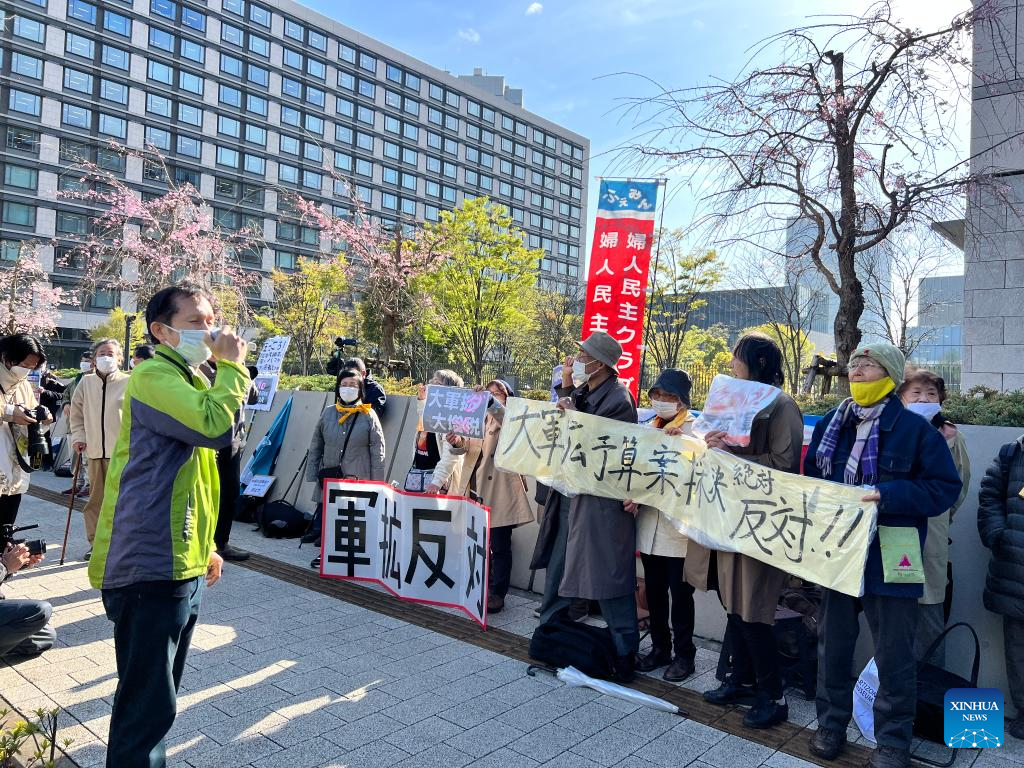Japan enacts record-high budget amid political, public backlash to soaring defense outlays

- By Xinhua News Agency
- March 29, 2023 1:25 PM
TOKYO -- Japan's parliament on Tuesday enacted a record 114.38 trillion yen (874.77 billion U.S. dollar) budget for fiscal 2023, including record allocations for controversial defense spending plans amid political and public opposition and against a backdrop of the country's dire fiscal health.
The government's budget includes a record 6.82 trillion yen (52.15 billion dollars) in defense spending, a 20 percent hike and the highest on record, for the first year of a controversial and unprecedented five-year spending plan.
The five-year plan has drawn staunch criticism from the public, opposition parties and scholars, in no small part due to the plan running contrary to Japan's constitutionally-bound pacifist stance.
For the year from April, non-tax revenue will be used to fund the government's defense outlays according to the budget, which will double from the county's long-held cap of spending equaling roughly 1 percent of the country gross domestic product (GDP), to around 2 percent of the GDP in the year starting April 2027.
From fiscal 2024 or later, meanwhile, a publicly-denounced hike of corporate and income tax, as well as an increase in tax of some consumer products, will be used to finance Japan's contentious broader defense spending plans.
Reserve funds, typically used for emergencies and not needing parliamentary approval, will also be used to fund part of the defense outlays, adding to the controversies.
"Part of the unused reserve funds for fiscal 2022 will be treated as surplus money, which in turn will be used for defense spending," Takuya Hoshino, a senior economist at the Dai-ichi Life Research Institute, was quoted as saying.
"If the government continues to allocate huge reserve funds for emergency use and divert part of what is left unused to future defense spending, it makes the flow of funds more complicated than necessary," said Hoshino.
Public objections aside, opposition party lawmakers as well as economists have quizzed Japanese Prime Minister and leader of the ruling Liberal Democratic Party (LDP) Fumio Kishida on exactly why the war-renouncing nation needs to drastically build up its defense and pay for it by hiking taxes.
The Democratic Party for the People, for example, has withdrawn the support it had previously shown for the government's fiscal 2022 budget, saying it is now opposed to plans to raise defense spending and hike taxes to fund it.
To fund the state budget, the government will issue 35.62 trillion yen (272.36 billion dollars) in bonds, adding to Japan's national debt, which is in dire straits at more than double the size of its economy and the worst among industrialized countries.
The budget also includes a record 36.89 trillion yen (282.13 billion dollars), the largest amount ever, for Japan's ballooning social security costs in a bid to deal with the country's rapidly aging society, one of the fastest-aging populations in the world.
Japan's more powerful lower house of parliament, controlled by the ruling LDP-led coalition, approved the draft budget in February. ■

People participate in a protest against the government's defense spending plans in Tokyo, Japan, March 28, 2023. Japan's parliament on Tuesday enacted a record 114.38 trillion yen (874.77 billion U.S. dollar) budget for fiscal 2023, including record allocations for controversial defense spending plans amid political and public opposition and against a backdrop of the country's dire fiscal health. (Xinhua/Jiang Qiaomei)















